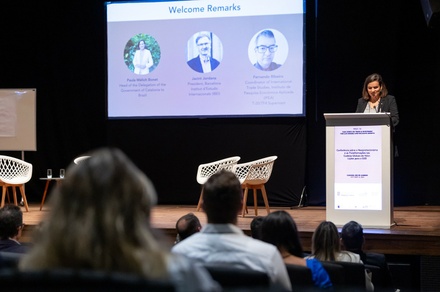Towards a New Geometry of Global Value Chains: Lessons for the G20
The Institut Barcelona d'Estudis Internacionals (IBEI) jointly with the Delegation of the Government of Catalonia to Brazil and relevant research centres, organised a side event on 16 October in Rio de Janeiro within the framework of the G20 Summit in Brazil this year, to debate the impact of neo-protectionism on the global economy and the need for fairer and more sustainable trade. The side event was related to the T20, a G20 engagement group that brings together think tanks and research centres from G20 members and guest countries and organisations.
▶️ Video recording available here.
Under the title Neo-Protectionism and the Changing Nature of Global Value Chains: Lessons for the G20, and focusing specifically on the work of the Task Force on trade and investment for sustainable and inclusive growth (TF04), the event brought together international experts who exchanged thoughts through two discussion panels.
Opening the event and welcoming attendees were the Generalitat de Catalunya delegate Paula Mèlich; the president of Institut Barcelona d’EstudisInternacionals (IBEI), Jacint Jordana; and the coordinator of the Instituto de Pesquisa Econômica Aplicada (IPEA), Fernando Riveiro. They all stressed the importance of strengthening relations between Catalonia and Brazil and addressed issues such as sustainability and the implications of neo-protectionism in global value chains.
Antoni Estevadeordal (IBEI and Georgetown Americas Institute), participated in the first panel 'New Trends in Global Value Chain Reorganization: The Rise and Impact of New Industrial Policies'. Estevadeordal presented the new policy brief Towards a New Geometry of Global Value Chains: Lessons for the G20, authored with Andrea C. Bianculli (IBEI), Jacint Jordana (IBEI), Alejandro Werner (Georgetown Americas Institute) and Theodore Kahn (Global Risk Analysis).
In the presentation, Estevadeordal stressed that new trends, such as home-shoring, friend-shoring and near-shoring, are reshaping global value chains, with a strong impact on geopolitics and sustainability.
The second panel 'Navigating Challenges and Opportunities in Global Value Chain Reorganization for Sustainable Development' brought together experts Carlos Coelho (PUC-Rio and BRICS Policy Center), Marcelo Regúnaga (Group of Southern Producing Countries), Luciana Ghiotto (Transnational Institute and Universidad Nacional de San Martín) and Paula Wojcikiewicz Almeida (FGV Rio Law’s Centre for Global Law).
The conclusion was given by the lead co-chair of the T20 Task Force 4, Vera Thorstensen, head of the Center on Global Trade and Investment at the Fundaçao Getulio Vargas, who reflected on the growing trend of using trade as a tool for geopolitical pressure, and the need to reform international regulations to promote fairer and more sustainable trade.
The event made is possible to define recommendations for the next G20 agenda, underlining the importance of a global dialogue to address the new dynamics of protectionism, ensuring the resilience and inclusiveness of global value chains.
The event was co-organized with the Delegation of the Catalan Government to Brazil, the BRICS Policy Center of the Pontifical Catholic University of Rio de Janeiro (PUC-RIO), the Centro do Comércio Global e Investimento (CCGI) of Fundação Getúlio Vargas (FGV), and the Georgetown Americas Institute (GAI).



